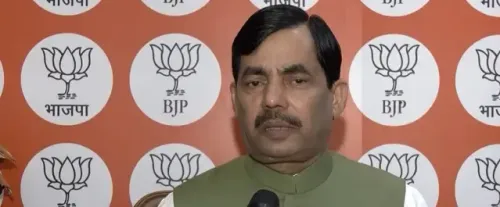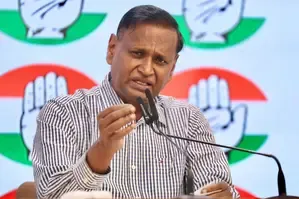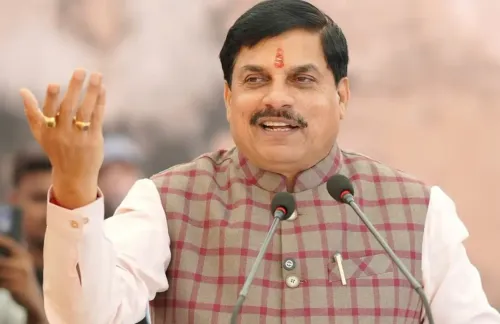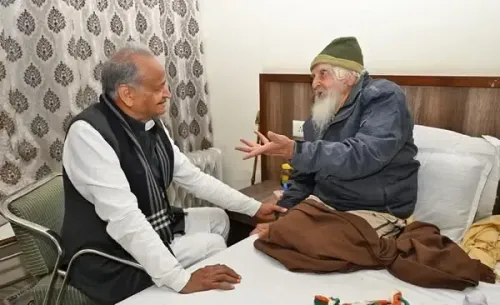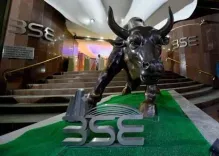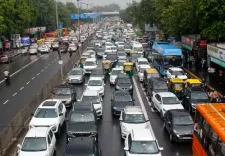Do Some Political Parties Want India to Become a Disturbed Bangladesh or Nepal?
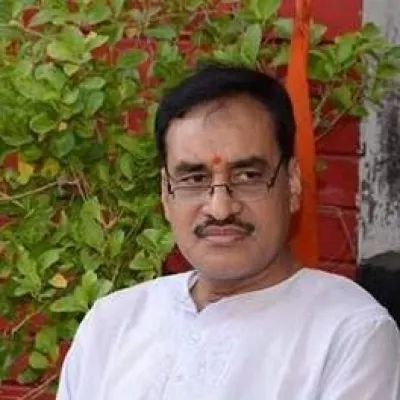
Synopsis
Key Takeaways
- Political tensions are rising in India over the 'I Love Muhammad' campaign.
- VHP spokesperson Vinod Bansal has raised serious allegations against political parties.
- The protests have resulted in violence and unrest in multiple states.
- Key political figures are weighing in on the government's response to the unrest.
- Critical questions about religious expression and constitutional rights are being highlighted.
New Delhi, Oct 3 (NationPress) Vinod Bansal, the National Spokesperson for the Visva Hindu Parishad (VHP), criticized political entities on Friday for what he described as misleading Muslim youth under the guise of the ‘I Love Muhammad’ initiative. He further alleged that these groups aspire to transform India into a troubled Bangladesh or Nepal by inciting unrest.
Bansal expressed his concerns via the social media platform ‘X’, stating, “Certain Muslim leaders and political factions envision turning our nation into a troubled Bangladesh and Nepal by misleading and provoking Muslim youth under the banner of ‘I love Muhammad’.”
He continued, “Their actions imply a preference for global terrorists such as Jaish-e-Mohammed, Mohammad Masood Azhar, Hafiz Mohammad Saeed, and Mohammad Ajmal Kasab, rather than the Prophet Muhammad himself. If you repeatedly declare that Islam is a religion of peace, then why are we witnessing violence, riots, and attacks in the name of Muhammad?”
What started as a routine decoration in Kanpur ahead of Eid Milad-un-Nabi has escalated over three weeks into one of the most contentious religious disputes in recent memory. An illuminated banner reading ‘I Love Muhammad’ displayed in the Syed Nagar area on September 4 sparked a series of crackdowns, FIRs, detentions, arrests, internet shutdowns, political disputes, and protests across Uttar Pradesh, Uttarakhand, Gujarat, and Maharashtra.
The most recent flashpoint occurred in Bareilly following a protest led by Muslim cleric Maulana Tauqeer Raza Khan after Friday prayers, which turned violent, leading to police intervention, arrests, and an internet blackout. This situation has evolved into a multifaceted issue, raising essential questions about religious expression, constitutional rights, and law-and-order management.
The most intense fallout from this controversy took place in Bareilly on September 26. After Friday prayers, a large crowd gathered in the streets near the Islamia locality, responding to the call from the influential cleric Maulana Tauqeer Raza Khan, who urged Muslims to participate in the nationwide ‘I Love Muhammad’ campaign, initially launched in Kanpur weeks earlier.
As people gathered with placards, chants, and religious slogans at various locations in Bareilly, including near the Ala Hazrat Dargah and the residence of Maulana Tauqeer Raza Khan, tensions escalated as the crowd moved towards Islamia Ground to submit a memorandum to local authorities. The situation quickly deteriorated into violence, including stone-pelting and vandalism, and reports of gunfire from unidentified sources prompted a swift police response.
The Samajwadi Party president Akhilesh Yadav criticized the government's handling of the situation, stating on the social media platform X, “Government should operate with harmony and goodwill, not through lathi charges.”
The All India Muslim Personal Law Board (AIMPLB) condemned the arrest of Maulana Tauqeer Raza Khan and others, demanding their immediate release, according to an official statement.
On Thursday, just before Friday prayers, Bareilly District Magistrate Avinash Singh announced that the administration was on high alert and assured that incidents similar to the violence on September 26 would not be tolerated. He emphasized that the clashes were a fallout of the ‘I Love Muhammad’ campaign and affirmed the district's commitment to a zero-tolerance policy for maintaining peace.

